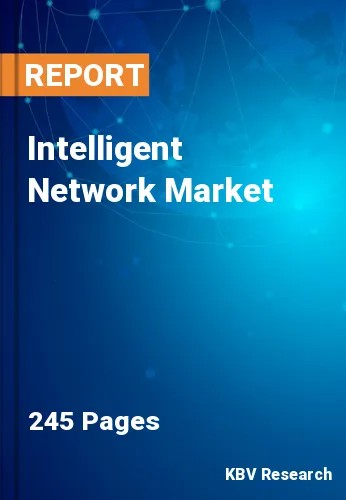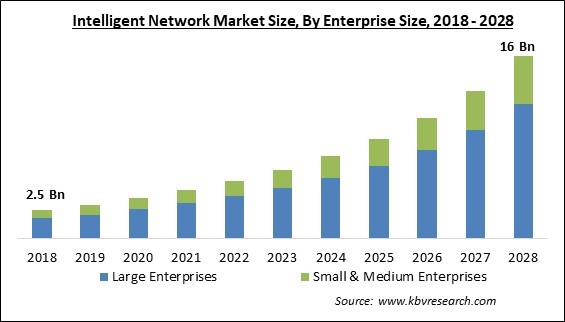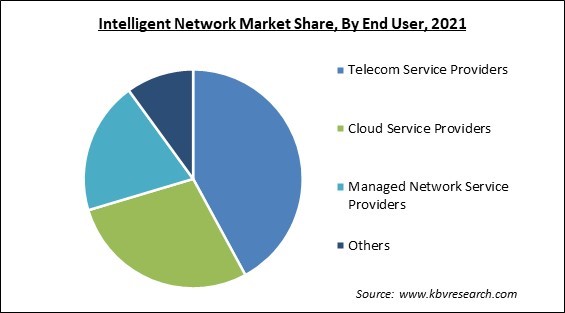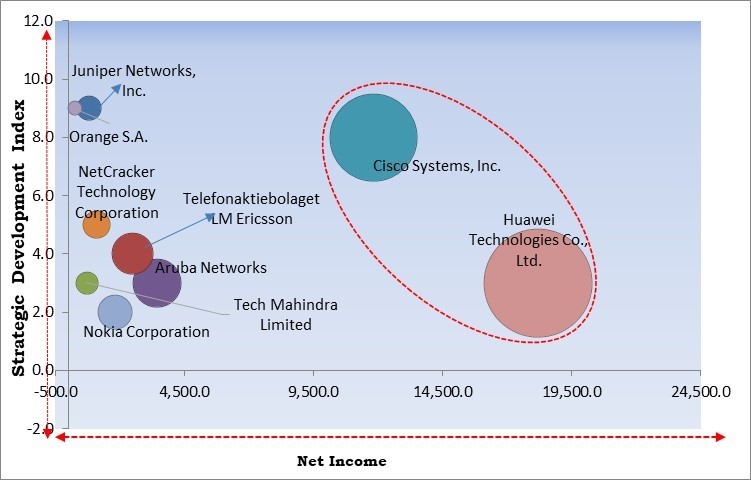
The Global Intelligent Network Market size is expected to reach $16 billion by 2028, rising at a market growth of 21.1% CAGR during the forecast period.
A telecommunications network architecture known as an intelligent network (IN) enables higher service integration and automation levels, allowing carriers to offer value-added services (VAS) to their consumers. The network's performance, dependability, and scalability are all improved through the application of cutting-edge technology like artificial intelligence (AI) and machine learning (ML). As a result, service providers can provide tailored services, streamline network administration, and cut costs by utilizing IN.

As a result, the consumer experience is enhanced, and the service providers have more options to earn money. The recommended ITU-T Q.1200 series standard network architecture is the intelligent network (IN). It is designed for use with both fixed and mobile telecom networks. Offering value-added services alongside conventional telecom services like ISDN, PSTN on fixed networks, and GSM on cellular phones or similar mobile devices enables operators to distinguish from the competition.
In contrast to approaches based on core switch intelligence or equipment, network nodes on the core network's service layer —as opposed to the switching layer—provide the intelligence. The majority of the time, telecom service providers like phone companies or mobile phone operators are the ones who own the IN nodes. In communication between network switching hubs and other network nodes operated by network operators, IN is provided by the Signaling System #7 (SS7) protocol. This technology is used by numerous systems that have been implemented worldwide. With new services being added regularly, the architecture has shown to be reliable and a consistent source of income.
COVID-19 had a favorable effect on the market for intelligent networks. This is due to the expansion of 5G deployment and end users' widespread use of intelligent network solutions to maintain business continuity worldwide. Due to the COVID-19 pandemic, which caused millions of people to live in isolation, reliable internet connection became essential for enabling people to work from home without having to travel to an office. Owing to the pandemic, the government put in place blockades to stop the virus's spread. Still, these restrictions caused many businesses to go online and increased the adoption of digital services globally. As a result, the demand for intelligent network solutions arose, which propelled market expansion.
Intelligent networks can deliver real-time network data that helps identify and fix network problems, enhancing network performance and decreasing downtime. Moreover, artificial intelligence and machine learning algorithms can instantly identify and stop security threats, enhancing network security and lowering the chance of security breaches. As a result, the incorporation of artificial intelligence and machine learning into intelligent networks enables better network performance, as well as the delivery of brand-new, cutting-edge services to clients. The market for intelligent networks is expanding as a result of these innovations.

The leading players in the market are competing with diverse innovative offerings to remain competitive in the market. The below illustration shows the percentage of revenue shared by some of the leading companies in the market. The leading players of the market are adopting various strategies in order to cater demand coming from the different industries. The key developmental strategies in the market are Acquisitions, and Partnerships & Collaborations.
An important opportunity for the market for intelligent networks is the broad adoption of 5G networks. The advantages of 5G networks over older generations of wireless networks include faster speeds, lower latency, as well as support for cutting-edge services, and the use of applications like the internet of things (IoT) and virtual reality. As 5G networks are implemented, there will be greater demand for intelligent network technologies to support the brand-new, intricate network infrastructure that 5G calls for. Operators can enhance customer experience, optimize network performance, and decrease downtime due to intelligent networks. This supports the growth of the regional market.
Since business models evolve quickly due to COVID-19, HR directors are pressured to reevaluate skill requirements. For this cohort, identifying and obtaining their organization's digital capabilities to enable digital transformation, as envisaged post-COVID-19, is no easy task. In order to succeed with transformation, technology skills must now be marbled throughout organizational departments and businesses. In addition, soft skills must also be added. Because of this, the development of the market is anticipated to be constrained by a lack of knowledge and capabilities in AI-based networking, along with high deployment costs.
Based on application, the intelligent network market is categorized into information cognition, traffic prediction & classification, resource management & network adoption, and performance prediction & configuration extrapolation. The traffic prediction and classification segment procured a considerable growth rate in the intelligent network market in 2021. Its use as a tool for resource management, network threat detection, and network service quality improvement accounts for the segment's expansion. Service optimization, cyberspace governance, and the elimination of cyber risks all depend on understanding how network systems are used and how they function.

On the basis of enterprise size, the intelligent network market is divided into large enterprises and small & medium enterprises. The large enterprises segment acquired the largest revenue share in the intelligent network market in 2021. Large enterprises now disseminate their data and applications over numerous data centers, clouds, and edge environments. To meet the demands of this fragmented hybrid ICT ecosystem, organizations need new networking architecture that is ready for the cloud, satisfies application connectivity requirements, and maintains technical and operational consistency across sites.
Based on end user, the intelligent network market is segmented into telecom service providers, cloud service providers, managed network service providers, and others. The telecom service providers segment witnessed the maximum revenue share in the intelligent network market in 2021. Network re-segmentation is utilized to accommodate increased capacity demand. However, this leads to node splitting that consumes time and pricey on-site network device changes. More network capacity is required when subscribers increase, and new services are provided.
| Report Attribute | Details |
|---|---|
| Market size value in 2021 | USD 4.3 Billion |
| Market size forecast in 2028 | USD 16 Billion |
| Base Year | 2021 |
| Historical Period | 2018 to 2020 |
| Forecast Period | 2022 to 2028 |
| Revenue Growth Rate | CAGR of 21.1% from 2022 to 2028 |
| Number of Pages | 245 |
| Number of Table | 363 |
| Report coverage | Market Trends, Revenue Estimation and Forecast, Segmentation Analysis, Regional and Country Breakdown, Competitive Landscape, Market Share Analysis, Companies Strategic Developments, Company Profiling |
| Segments covered | Enterprise Size, Application, End User, Region |
| Country scope | US, Canada, Mexico, Germany, UK, France, Russia, Spain, Italy, China, Japan, India, South Korea, Singapore, Malaysia, Brazil, Argentina, UAE, Saudi Arabia, South Africa, Nigeria |
| Growth Drivers |
|
| Restraints |
|
On the basis of region, the intelligent network market is analyzed across North America, Europe, Asia Pacific, and LAMEA. The North America segment procured the highest revenue share in the intelligent network market in 2021. This is related to the existence of market participants who provide best-in-class network technology and services. Also, expanding IoT devices and 5G networks across the region promotes the demand for IN. The market for intelligent networks in North America is expanding primarily due to the increasing deployment of network equipment and network security solutions.
Free Valuable Insights: Global Intelligent Network Market size to reach USD 16 Billion by 2028

The major strategies followed by the market participants are Product Launches. Based on the Analysis presented in the Cardinal matrix; Cisco Systems, Inc. and Huawei Technologies Co., Ltd. are the forerunners in the Intelligent Network Market. Companies such as Aruba Networks, NetCracker Technology Corporation and Nokia Corporation are some of the key innovators in Intelligent Network Market.
The market research report covers the analysis of key stake holders of the market. Key companies profiled in the report include Orange S.A., Tech Mahindra Limited, Juniper Networks, Inc., Nokia Corporation, Cisco Systems, Inc., Huawei Technologies Co., Ltd. (Huawei Investment & Holding Co., Ltd.), NetCracker Technology Corporation (NEC Corporation), Telefonaktiebolaget LM Ericsson, Aruba Networks (Hewlett Packard Enterprise Company) and Colt Technology Services Group Limited.
By Enterprise Size
By Application
By End User
By Geography
The global Intelligent Network Market size is expected to reach $16 billion by 2028.
Advancement of technologies like artificial intelligence as well as machine learning are driving the market in coming years, however, Limited data capabilities and high deployment costs restraints the growth of the market.
Orange S.A., Tech Mahindra Limited, Juniper Networks, Inc., Nokia Corporation, Cisco Systems, Inc., Huawei Technologies Co., Ltd. (Huawei Investment & Holding Co., Ltd.), NetCracker Technology Corporation (NEC Corporation), Telefonaktiebolaget LM Ericsson, Aruba Networks (Hewlett Packard Enterprise Company) and Colt Technology Services Group Limited.
The Information Cognition segment acquired maximum revenue share in the Global Intelligent Network Market by Application in 2021 thereby, achieving a market value of $5.7 billion by 2028.
The North America market dominated the Global Intelligent Network Market by Region in 2021, and would continue to be a dominant market till 2028; thereby, achieving a market value of $5.6 billion by 2028.
Our team of dedicated experts can provide you with attractive expansion opportunities for your business.
